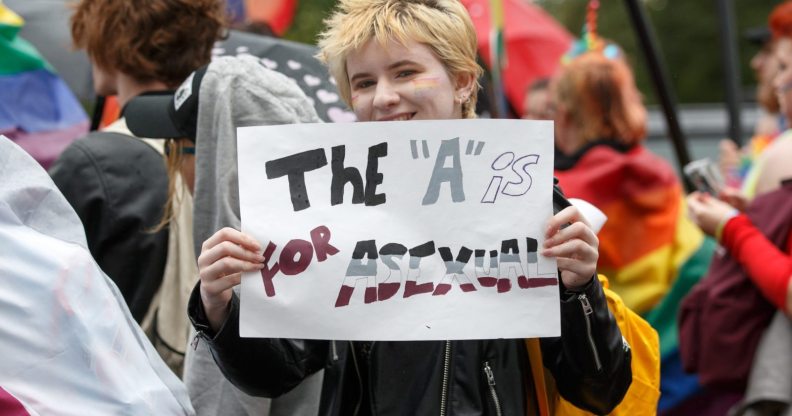The Oxford English Dictionary now includes ambisexual, asexual, bi-gender and trans*

1.7 percent of sexual minority people in the US identify as asexual. (Robert Perry/ Getty)
The Oxford English Dictionary has added trans*, ambisexual, asexual and bi-gender to its lexicon.
Trans* is perhaps the most overdue addition, considering that the trans umbrella term has been in use for decades at this point.
The OED definition of trans* states that it was “originally used to include explicitly both transsexual and transgender, or (now usually) to indicate the inclusion of gender identities such as gender-fluid, agender, etc., alongside transsexual and transgender.”

(Photo by Spencer Platt/Getty Images)
Asexual is another word which has been in the public consciousness for a long while.
The Asexual Visibility and Education Network was founded in 2001, and the term originated years before then.
The OED defines the term as being “without sexual feelings or associations.”

Ambisexual is a less commonly used term, but has risen in popularity as a word for people who are, as the OED puts it, “bisexual or androgynous.”

(Getty)
And as the dictionary notes, the word originated in the 1930s, so it’s hardly a new fad.
According to the OED, bi-gender, another word added to the dictionary today, is “denoting or relating to a person whose sense of personal identity encompasses two genders.”
Last year, Merriam-Webster revealed that back when homosexuality was illegal, trans rights were unheard of and gender was widely presumed to be completely binary, it was going against the grain.

Merriam-Webster’s unabridged dictionary of 1934 featured the gender-neutral pronoun “thon” – short for “that one” – and continued to include the word until 1961.
In an article on its site, the dictionary also gently rebuked those who make “one of the most common complaints” about English, pointing out gender-neutral pronouns exist in its pages.
Earlier this year, Japan’s leading dictionary added a definition of LGBT for the first time, but got it slightly wrong, defining the term as “people who have different sexual orientations from the majority.”

(Getty)
In 2013, after same-sex marriage was legalised in England and Wales, the OED changed the definition of the word ‘marriage’ to keep up with the new legislation.
It is now defined as “the legally or formally recognised union of two people as partners in a personal relationship.”

